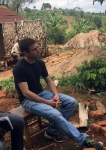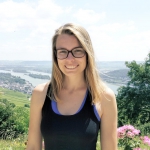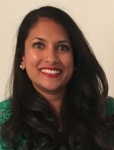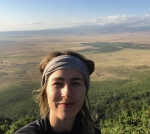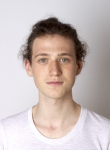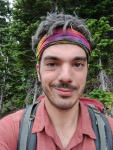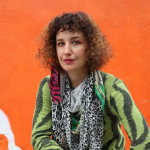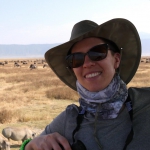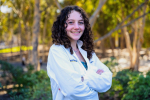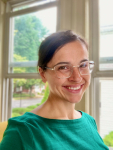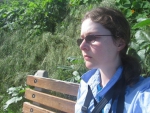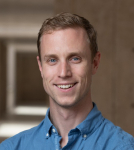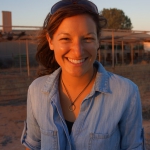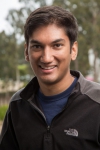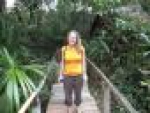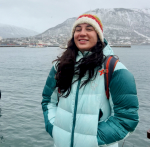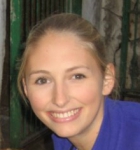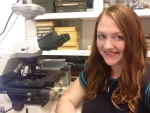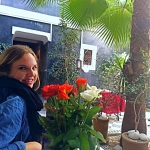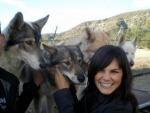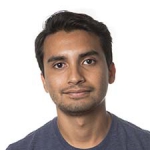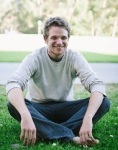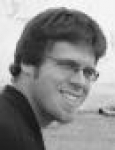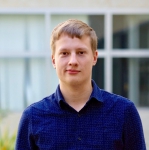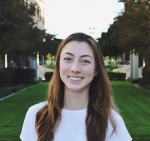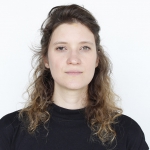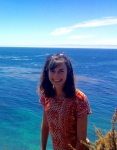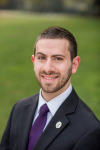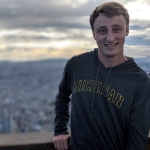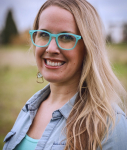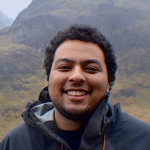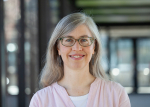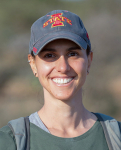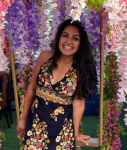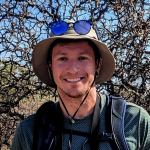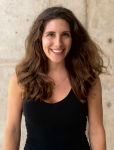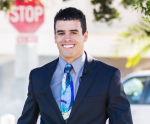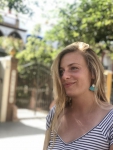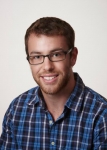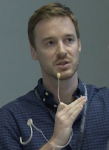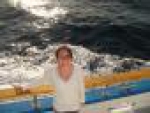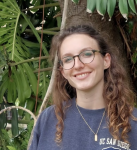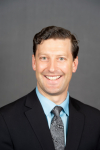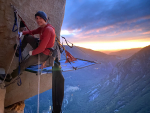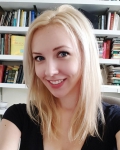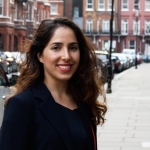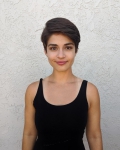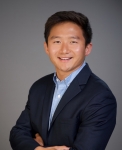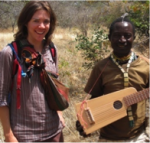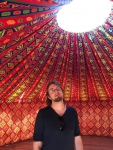Graduates
CARTA has 55 anthropogeny specialization graduates:
|
Neurosciences
Jason Adams is an MD/PhD student at UC San Diego. He completed his PhD in the Department of Neurosciences and the lab of Dr. Alysson Muotri. Jason is particularly interested in how microscopic neurological systems, such as neuronal structural and functional interconnectivity, manifest as macroscopic phenomena, including memory, cognition, and behavior. In addition, he is interested in neural structure across the lifespan, from development to degeneration. He is currently completing the final... more |
Cognitive Science
In 2022, I graduated with a PhD in Cognitive Science with specialization in Anthropogeny. I focused my research on the cognitive and brain development of children born preterm and full-term. Specifically, I am interested in the long-term effects of preterm birth on higher cognitive functions such as mathematics skills. I continue my research in this field while also working as a lecturer at UC San Diego. I currently teach cognitive neuroscience and environmental effects on early human... more |
|
Psychology
Tanushree Agrawal, PhD, is an Asst. Project Scientist and Psychology Lecturer at UC San Diego. As a member of the Mind & Development Lab, run by Dr. Adena Schachner, she studies social and emotional aspects of music perception. Tanushree is particularly interested in why music is able to evoke incredibly strong emotional responses in listeners, and how such feelings may be prosocial in nature.
Her current research program involves understanding: (1) Moral consequences of music: Why does... more |
Visual Arts
Vanessa Bateman is a historian of visual culture and media, nonhuman animals, and the environment. She is the co-editor of Globalizing Wildlife (University of North Carolina Press, 2026) and is currently writing a book on the intersection of avian visual media and grassroots environmentalism in 20th century North America. From 2025–2027 she is a Social Sciences and Humanities Research Council of Canada Postdoctoral Fellow at Trent University and was a postdoctoral researcher on the project... more |
|
Anthropology
Melanie Beasley is an assistant professor at Purdue University where she directs the Bioanth Isotope Ecology Research Laboratory (BIER Lab). Melanie Beasley received her Ph.D. from the University of California, San Diego in 2016. From 2017-2019, she was a Haslam Postdoctoral Fellow at the University of Tennessee, Knoxville conducting research at the Forensic Anthropology Center.
Dr. Beasley’s work focuses broadly on human-environment interactions throughout the hominin lineage when the... more |
Cognitive Science
Felix is a second year PhD student in the cognitive science department working on cognitive tools for planning and physical reasoning. Humans use cognitive tools: tools that help think. How do such cognitive tools support humans in making efficient use of their limited cognitive capacities on hard computational problems such as planning? Felix researches the computational nature of such tools using agent-based simulations. This research—best described as computational cognitive science—aims to... more |
|
Neurosciences
Matt Boisvert received his PhD in Neuroscience in 2018, working in the lab of Nicola Allen. Through his graduate work, he demonstrated that astrocytes adopt an injury-like profile in the aging brain through a combination of genetic profiling and microscopy. He continued to address how universal these glial inflammatory signals are, and their impact on physiology, with a postdoctoral fellowship studying fruit fly glia at Oregon Health and Science University. Matt leverages a broad background in... more |
Visual Arts
Emily Verla Bovino, PhD, is an artist, art historian and writer who works with curation. From 2018 to 2023, she was based in Hong Kong where she was a research fellow in Design and Architecture at the M+ Museum of Visual Culture in 2021 and a Research Grants Council Postdoctoral Fellow at the School of Creative Media, City University of Hong Kong from 2022 to 2023. She is presently Assistant Professor in the Department of Performing and Fine Arts at the City University of New York, York College... more |
|
Neurosciences
Alison Caldwell completed her Ph.D in Neurosciences in 2019 at UC San Diego, where she was a member of Dr. Nicola Allen’s lab at the Salk Institute. Alison worked to answer questions about the role of astrocytes in synaptogenesis: How do astrocytes time their release of synaptogenic factors? What are the identities of these factors? How are they secreted by the astrocytes? What are the neuronal receptors responding to them? How do genetic mutations affect astrocyte function and how do those... more |
Biomedical Sciences
Mika is a PhD student in the UCSD Biomedical Sciences Program in the lab of JoAnn Trejo in the Pharmacology Department. She is currently working to understand the role of the Src family kinases (SFKs) in G protein-coupled receptor signaling to the Hippo pathway as a regulator of breast cancer progression. In addition, she is interested in understanding the molecular mechanisms that regulate a tumor suppressor known as ARRDC3 in the context of breast carcinoma and to elucidate the networks that... more |
|
Cognitive Science
Ben Cipollini is the CTO at FluentPet and a Tech Due Diligence consultant with the Clover Group . While getting his Ph.D. in Cognitive Science at UC San Diego, Ben was interested in human behavior through another lens: how does having asymmetrically structured and functioning brains make us human? He used computational modeling of development to understand how brain asymmetries can explain why the visual system parsing a visual scene asymmetrically (with the left hemisphere more focused on... more |
Biomedical Sciences
I am a board certified infectious diseases physician and a scientist studying the antibody response to Mycobacterium tuberculosis. I completed my MD and PhD degrees at UCSD in 2015, where I was lucky enough to be one of the first cohort of CARTA graduate students. My graduate work was in the laboratory of Ajit Varki, studying the evolutionarily conserved exclusion of the sialic acid Neu5Gc from the vertebrate brain. I subsequently completed my clinical training in internal medicine and... more |
|
Linguistics
Emily Davis is a graduate student in linguistics and advisee of Robert Kluender who also works in the Gentner Lab, and has worked with Kenny Smith at the University of Edinburgh. She recieved her PhD in linguistics from UCSD in 2023. She is interested in the cognitive basis of linguistic recursion: the process by which one sentence can be nested within another. Where does recursion in languages come from? How does linguistic recursive structure relate to other cognitive abilities, such as task... more |
Neurosciences
Kyle Fischer received his PhD in neuroscience from UC San Diego in 2018. His thesis work was conducted in the lab of Dr. Ed Callaway at the Salk Institute, where he developed viral-based tools for neuroscientific applications. Kyle now works at Neurocrine Biosciences in San Diego, where he applies the skills he learned during his PhD to help develop curative gene therapies for neurological disorders. In his free time you can find Kyle outside birding, brushing up on his botany, or sharing a... more |
|
Cognitive Science
I'm a postdoctoral scholar working at the National Center for Ecological Analysis and Synthesis (NCEAS) at UC Santa Barbara, in collaboration with the Nature Conservancy. These days my passion for both marine ecology and human origins has lead more and more into the future. My current work focuses on the relationship between sustainable marine ecosystems and resilient coastal communities in context of climate change, including socially and ecologically driven solutions to marine resource... more |
Neurosciences
Anupam Garg is currently a vitreoretinal surgery fellow in ophthalmology at the Wilmer Eye Institute at Johns Hopkins University in Baltimore, Maryland. At UCSD, Anupam was a medical and graduate student in the Medical Scientist Training (MD/PhD) Program and completed his PhD in Professor Ed Callaway's laboratory at the Salk Institute for Biological Studies, followed by a residency in ophthalmology at the Wilmer Eye Institute. Within both medicine and science, Anupam's interests are closely... more |
|
Anthropology
Sara Goico is currently a University of California President’s and National Science Foundation SBE Postdoctoral Fellow in the Department of Sociology at the University of California, Los Angeles. She received her PhD in Anthropology (linguistic) in 2019 from the University of California, San Diego. Sarah's research focuses on language and social interaction when participants have asymmetric sensory access. Her research brings together ethnographic methods with the microanalysis of video... more |
Neurosciences
Julia Gorman is a PhD student in Neurosciences at UC San Diego in the Gentner lab. She studies how neural population dynamics flexibly generate learned behaviors, using songbirds as a model for vocal communication. Combining large-scale electrophysiology with dynamical-systems analyses, Julia examines how internal expectations and sensory evidence shape low-dimensional trajectories during auditory decisions and how these trajectories relate to perception. In parallel, she investigates... more |
|
Anthropology
Kiri Hagerman graduated with a PhD in Anthropological Archaeology in 2018. During her academic career, she participated in archaeological projects in Syria, Belize, Mexico, and the United States. Her undergraduate degree from Princeton University was in Art and Archaeology with a focus on Amarna period art in Ancient Egypt. In 2009, she came to UC San Diego to pursue a doctorate in Anthropological Archaeology with a focus on Mesoamerica. For her M.A. thesis, she excavated an elite household at... more |
Anthropology
Kari Hanson is a postdoctoral research fellow with the Institute for Neural Computation at UCSD. Her research explores human brain evolution from the perspective of examining interspecific variation in neuroanatomy in extant humans and non-human primates on one hand, and intraspecific variation targeting extraordinary variations of the human mind from the perspective of neurodiversity in autism spectrum disorders and Williams syndrome on the other. Kari's ongoing projects in the Laboratory for... more |
|
Psychology
Stefanie Holden is a Ph.D. student in Psychology at UC San Diego in Dr. Karen Dobkins’s Human Experience and Awareness Lab (HEALab). She is primarily interested in exploring the impact of conflicting social and cultural influences on how people make sense of their lives and identities via the life stories they tell. By integrating life experiences into an internalized and evolving story, individuals are able to draw connections between their past, present, and future while simultaneously... more |
Anthropology
Caroline Horton Lew is a human comparative neuroanatomist, and received a Ph.D. in Biological Anthropology from UC San Diego in 2018. Her doctoral work utilized quantitative stereological methods in postmortem human brains to examine microstructural differences in limbic structures of neurodevelopmental disorders with atypical sociobehavioral phenotypes. She completed a one-year postdoc, also at UC San Diego, where she identified key differences in the serotonergic innervation of the amygdala... more |
|
Neurosciences
Javier How is a postdoctoral fellow in the labs of Misha Ahrens, Florian Engert, and Joshua Vogelstein at Janelia Research Campus, Harvard University, and Johns Hopkins University, respectively. He is interested in how animals navigate and learn across their lives. He previously earned his Ph.D. in Neurosciences at UC San Diego in the labs of Saket Navlakha and Shrek Chalasani – his focus was on how the network properties of the brain change as an animal processes different odorants.
|
Neurosciences
Stephen earned his PhD in Neurosciences from UCSD, with specializations in Anthropogeny and Computational Neuroscience, while working in the lab of Fred Gage at the Salk Institute. He now works as an infectious disease epidemiologist in California.
|
|
Cognitive Science
My interest is in multi-agent coordination and communication. My data mining efforts focus on creating a massive dataset concerning the link between bottlenose dolphin vocalizations, behavior, and social configuration. My modeling efforts focus on the problem of how decentralized agents should coordinate through the use of their bodies and sounds to achieve certain joint goals.
Bottlenose Dolphin Signature Whistles: Variation and Context
Understanding dolphin communication involves studying... more |
Cognitive Science
I am a graduate student in the Department of Cognitive Science at UCSD working in the Comparative Cognition Laboratory of Dr. Federico Rossano. A psychologist by training, I have spent the last years mainly studying the behavior and cognitive abilities of different ape species (gibbons, orangutans, gorillas, humans, bonobos, chimpanzees). My research aims at gaining insights about the ultimate and proximate origins of social cognition in humans and animals through comparative and developmental... more |
|
Biomedical Sciences
Kendall is a Ph.D. student in the Biomedical Sciences program at UCSD. She works in Bjoern Peters's lab at the La Jolla Institute for Immunology and is currently investigating the immune signatures of unconventional T cells in multiple diseases. She is using cell analysis techniques and bioinformatics to analyze the differences between T cell subsets and disease state and will also be using biochemical techniques to identify ligands of selected T cell receptors identified through computational... more |
Visual Arts
Nico King is a Ph.D. student in Visual Arts at UC San Diego and she is an alum of the Graduate Specialization in Anthropogeny. She is an interdisciplinary artist, researcher in modern landscape history, and a trained landscape designer. Her doctorate work focuses on speculative natures and utopian moments of the built landscape in a materialist perspective. Her research interests in the CARTA specialization revolve around the origins of human habitation as construction of an “inside”... more |
|
Neurosciences
Megan Kirchgessner is a postdoctoral fellow in the lab of Dr. Robert Froemke at the New York University School of Medicine. She received her Ph.D. in neurosciences from the University of California, San Diego, and her B.A. in cognitive sciences and psychology from Rice University. She is interested in how neural circuits for sensory processing are constructed and modified by experience and used for social behaviors.
For her doctoral research in the lab of Dr. Edward Callaway at the Salk... more |
Neurosciences
Born and raised in southwestern Virginia, Landon received a PhD in Neurosciences at the University of California, San Diego, along with an interdisciplinary specialization in Anthropogeny (the study of human origins). Landon’s dissertation explored how psychedelic drugs act on the brain to alter perception and behavior in order to better understand how similar symptoms arise in mental illnesses such as schizophrenia. Landon also received dual BS degrees in Biology and Psychology from the... more |
|
Biomedical Sciences
Reid is a Ph.D. student in the Biomedical Sciences program at UC San Diego. His research in Dr. Richard Daneman’s lab focuses on the tight regulation of substances entering and exiting the brain, controlled by the special properties of the brain’s blood vessels. This “blood-brain barrier” is critical to maintaining homeostasis and its dysfunction plays a role in the in the pathology of diseases such as Multiple Sclerosis and Alzheimer’s disease. Specifically, Reid is studying the role of the... more |
Psychology
Emily Little, PhD, is a perinatal health educator, researcher, and advocate, and is the Founder and Executive Director of Nurturely (nurturely.org). She completed her PhD in experimental psychology at University of California, San Diego where she combined approaches from anthropology, psychology, and public health to explore infant-caregiver interaction and perinatal health systems. Her community-based research continues at Nurturely with the end goal of improving policies and societal... more |
|
Cognitive Science
James Michaelov is a Ph.D student in the cognitive science graduate program at UC San Diego, working in the Language and Cognition Lab with Ben Bergen. His work combines experimental and computational methods to shed light on the neurocognitive processes underlying human language comprehension and production and how these interact with other systems.
|
Linguistics
Hope Morgan is a alumnus from the first cohort of anthropogeny graduate specialization students. Her research primarily focuses on the systemic properties of sign language lexicons, guided by the following questions. How do signs emerge and take on categorical formational properties in relation to other signs in a lexicon (i.e., phonology and morphology)? How are those forms constrained by communicative and learnability pressures, such as confusability, frequency, articulatory ease, and... more |
|
Anthropology
Corinna Most is a faculty member in the Department of Ecology, Evolution, and Organismal Biology at Iowa State University. She is also the co-Director of the Uaso Ngiro Baboon Project, in Kenya. She received her Ph.D. in Biological Anthropology with a specialization in Anthropogeny from the University of California San Diego in 2018, under the mentorship of Dr. Shirley Strum. Dr. Most's research program involves two main lines of investigation: 1) the ontogeny of social competence in wild olive... more |
Anthropology
Shubhra Murarka is a PhD student in the Department of Anthropology with specializations in Biology and Science Studies and a member of the Non Lab. She approaches questions from a biocultural lens and is deeply committed to interdisciplinary scholarship. Her research focuses on genomics, racial and social (in)equity, the impact of colonial encounters on genome diversity, Indigenous health outcomes, and bridging social theory with biological methods.
|
|
Biological Sciences
Nicholas Nelson is a UCSD Biological Sciences Ph.D. Candidate in Axel Nimmerjahn’s lab at the Salk Institute. Nicholas’s research interests lie in the interface of the nervous and immune systems, and his thesis research investigates how glial cells in the spinal cord regulate nervous system homeostasis and inflammation during the development of chronic pain. More broadly, Nicholas is interested in what shaped the evolution of the human mind – what cellular and molecular actions underlie... more |
Neurosciences
I joined CARTA while completing my PhD in neurosciences at UC San Diego. I was working in Dr. Richard Daneman’s lab, where I studied brain vasculature in health and disease, with a particular focus on the intersection of immunology and neuroscience. I am incredibly grateful for the experiences and community that I gained from being a part of CARTA. Currently, I am postdoctoral associate in Dr. Ardem Patapoutian's lab at Scripps Research, where I am working to understand how the body senses and... more |
|
Neurosciences
Sequoyah Reynoso is a high school biology, chemistry, neuroscience and psychology teacher in Massachusetts. He previously studied cell-surface molecules on sperm cells in the lab of Pascal Gagneux and earned a PhD in 2018. While winning a mate is an important step in sexual selection, there are additional biological obstacles to hurdle in order to successfully procreate. For instance, compatibility between male and female gametes is vital for successful fertilization and survival of the embryo... more |
Neurosciences
Meghan Rossi is a PhD student in the UCSD Neurosciences Graduate Program. As a member of Dr. Richard Daneman's lab, Meghan is focused on examining the effects of peripheral factors, including dietary intake and exercise, on the special properties of the blood vessels in the brain termed the "blood-brain barrier." In addition, she is interested in the role of blood-brain barrier circadian rhythm on Alzheimer's disease pathogenesis, as well as the potential role of the gut microbiome in... more |
|
Psychology
Tim is a postdoc at Harvard Medical School. He completed his PhD in the Psychology department at UCSD with Tim Gentner, alongside a specialization in Anthropogeny. His research interests sit at the intersection between biology, cognition, and machine intelligence. His research experiences range from computational approaches, such as machine perception and statistical modeling, to behavioral approaches, such as field ethology with chimpanzees and operant conditioning with songbirds, to... more |
Cognitive Science
Andrew Schork is a research leader at the Institute for Biological Psychiatry, Copenhagen University Hospital and an Associate Professor at the GLOBE Institute, Copenhagen University. He is a human geneticist interested in the etiology of complex disease, especially psychiatric disorders. The Schork lab combines Danish national healthcare data and other large biobank resources with tools from quantitative genetics to identify, characterize, and deploy genetic risk factors in service of... more |
|
Linguistics
Nina Semushina is currently an Associate Director of the Research Labs in the Roman Family Center for Decision Research at the University of Chicago
They completed their Ph.D. in Linguistics in 2021, and their advisor was Rachel Mayberry. At UCSD, Nina worked in the Mayberry Lab for Multimodal Language Development, where they studied sign languages, language evolution, the relationship between language and number, and the impact of delayed language exposure on adults' language abilities.
They... more |
Neurosciences
I am a neuroscientist interested in the developing visual system. I am currently studying the response and recovery after neural injury in the optic tectum (a region analogous to the mammalian superior colliculus) of Xenopus laevis tadpoles. By studying the effects of altered gene expression of a highly conserved gene such as Candidate Plasticity Gene 15 (CPG15), I can begin to understand the differences between neural injury response in the adult system versus the developing system. Since... more |
|
Neurosciences
Sheila Steiner is a Ph.D. student in the UC San Diego Neurosciences graduate program. She is co-advised by Dr. Rusty Gage and Dr. Carol Marchetto. She uses stem cell-derived neurons to understand how energy metabolism changes across neuronal development and neuronal aging in humans as compared to other primate species. She is broadly interested in whether there is a trade-off between both humans' unique level of cognitive functioning and humans' relative longevity compared to other primates and... more |
Biomedical Sciences
Dr. Robert Thomas is an academic endocrinologist and clinical investigator at the University of California, San Diego. He received his MD and completed Internal Medicine Residency at UCSD. During graduate school, he completed a PhD with Dr. Asa Gustafsson with a specialization in Anthropogeny through CARTA. The coursework and fieldwork he completed with CARTA continue to guide his research today. Mitochondrial DNA helped unlock human origins, and Dr. Thomas is currently investigating the role... more |
|
Psychology
Camille earned her PhD in 2017. Today, she lives in Denver, Colorado and is completing her postdoctoral research in the Pain Science Program at CU Anschutz under Dr. Yoni Ashar. She is interested in brain mechanisms that persist chronic pain in humans. She was previously a Director for Data Science at various technology companies before transitioning back to academia.
Her graduate work was in Experimental Psychology where she studied animal behavior in the laboratory of Dr. Cory Miller at UC... more |
Biomedical Sciences
Michael completed the Anthropogeny Specialization while he was a student in the UCSD Biomedical Sciences graduate program (PhD, 2021). During his doctoral studies in Ajit Varki's lab, he found that human lineage-specific changes in sialic acid genes affect the structures of polysialic acids and sialic acid receptor signaling. As a student in CARTA's training program, Michael participated in the Africa field course in 2017, and especially enjoyed the symposia and research rounds. He is currently... more |
|
Psychology
Katie is a seventh-year Ph.D student in Experimental Psychology at UC San Diego and a member of Dr. Stephan Anagnostaras’s Molecular Cognition lab. Katie's primary research interests include contextual memory and exploring pharmacological therapies for psychiatric disorders. Additionally, Katie also studies cognitive performance and neuroplasticity in bottlenose dolphins. She works primarily with non-human animals (mice and dolphins), and her work includes the use of behavioral paradigms and... more |
Anthropology
Linnea Wilder completed her Ph.D in Biological Anthropology in 2020 at UC San Diego, working under Dr. Katerina Semendeferi in the Laboratory of Human Comparative Neuroanatomy. Her research interests lie in the evolution and development of the brain, and in defining neuroanatomical features and developmental patterns that are either unique to humans or shared with our closest living relatives, the great apes. Her doctoral work explored the role of glial cells in Williams Syndrome. Linnea now... more |
|
Psychology
Haleh Yazdi is a postdoctoral fellow with the Developing Belief Network at UC San Diego. She received her PhD in Experimental Psychology in 2022 under the mentorship of Profs. David Barner and Gail Heyman. As an Anthropogeny Specialization student, Haleh was able to merge her interests in human development, evolutionary psychology, anthropology, and moral cognition into a cohesive research program.
Haleh’s research aims to understand how children develop group prejudices, notions of fairness... more |
Psychology
Anne Yilmaz Ph.D. is a researcher and instructor at UC San Diego working in the Department of Psychology. Her research investigates the mechanisms of human memory. Broadly, she conducts memory research with potential application to real-world problems—specifically eyewitness memory—that is grounded in basic cognitive science. During her Ph.D training in experimental psychology at UC San Diego, Anne worked under Dr. John Wixted in his human memory lab. She conducted memory research with... more |
|
Biomedical Sciences
James Yu is a PhD candidate in the Simonson Lab at UC San Diego. He is interested in identifying and understanding genetic, metabolic, and physiological variation in high-altitude populations that have allowed them to adapt to low oxygen environments. He is also interested in how archaic introgression from Denisovans may play an adaptive role in high-altitude adaptation in Tibetans. He believes understanding the origins of the human phenomena is not only fascinating, but necessary to provide... more |
Biomedical Sciences
Rachel Zarndt is a graduate of UCSD's Biomedical Sciences program, and in 2014 successfully completed CARTA's Anthropogeny Specialization. As part of her CARTA experience, she traveled through the highlands of Ethiopia trekking with inhabitants of Ras Dejan. These Ethiopians have lived for multiple generations at high altitude for possibly the longest history of all modern humans.
Her thesis focused on comparative physiology and genetics of high altitude adaption in human and animal populations... more |
|
Linguistics
Matthew Zaslansky is a Ph.D student in Linguistics at UC San Diego who investigates the (in)stability of redundant subsystems in languages at the individual and population levels. Language exhibits the complex coexistence of a tendency towards efficiency and economy on one hand, and variable amounts of stable redundancy (e.g. synonymy) on the other hand. Matthew’s earlier research has focused on synonymy and morphological variation in American Sign Language (ASL) and Azerbaijani. The question... more |
